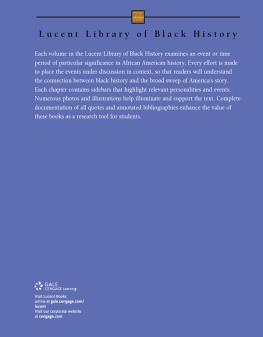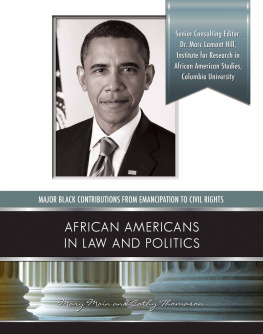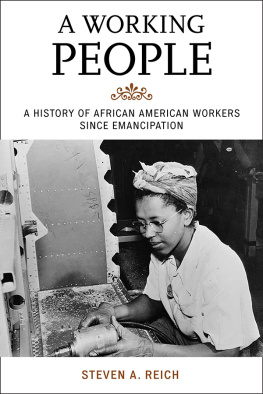Writing History from the Margins
With contributions from leading American and European scholars, this collection of original essays surveys the actors and the modes of writing history from the margins of society, focusing specifically on African Americans.
Nearly one hundred years after The Journal of Negro History was founded, this book assesses the legacy of the African American historians, mostly amateur historians initially, who wrote the history of their community between the 1830s and World War II. Subsequently, the growth of the civil rights movement further changed historical paradigmsand the place of African Americans and that of black writers in publishing and in the historical profession. Through slavery and segregation, self-educated and formally educated Blacks wrote works of history, often in order to inscribe African Americans within the main historical narrative of the nation, with a two-fold objective: to make African Americans proud of their past and to enable them to fight against white prejudice.
Over the past decade, historians have turned to the study of these pioneers, but a number of issues remain to be considered. This anthology contributes to answering several key questions concerning who published these books, and how they were they distributed, read, and received. Little has been written concerning what they reveal about the construction of professional history in the nineteenth century when examined in relation to other writings by Euro-Americans working in an academic setting or as independent researchers.
Claire Parfait is Professor of American Studies and Book History at Universit Paris 13.
Hlne Le Dantec-Lowry is a Professor of American Studies at Universit Sorbonne Nouvelle (Paris, France), where she directs the Center for Research on North American History (CRAN).
Claire Bourhis-Mariotti is an Associate Professor of American History at Universit Paris 8.
Although various scholars have called for focused attention to early African American historians, those calls have largely gone unanswered, until now. Writing History from the Margins shows us what we can learn when we take on the deeply interdisciplinary work of studying African American historians and historiography directly, and not just as a sidebar to other concerns. With attention to print, material, and visual cultures, Writing History from the Margins adds significantly to our understanding of a large range of effortsnational and local, encyclopedic and specificto record and shape African American history.
John Ernest, author of Liberation Historiography: African American Writers and the Challenge of History, 17941861
By taking two side stepslooking at marginal historians and departing from the main historiographical trendsthis very coherent collection of essays offers new perspectives and devises new methodologies to interpret extremely varied sources. This transatlantic, transdisciplinary discussion makes Antebellum black voices heard and reintegrates them into the wider national narrative.
Nathalie Dessens, University of Toulouse-Jean Jaurs
First published 2017
by Routledge
711 Third Avenue, New York, NY 10017
and by Routledge
2 Park Square, Milton Park, Abingdon, Oxon, OX14 4RN
Routledge is an imprint of the Taylor & Francis Group, an informa business
2017 Taylor & Francis
The right of the editors to be identified as the authors of the editorial material, and of the authors for their individual chapters, has been asserted in accordance with sections 77 and 78 of the Copyright, Designs and Patents Act 1988.
All rights reserved. No part of this book may be reprinted or reproduced or utilised in any form or by any electronic, mechanical, or other means, now known or hereafter invented, including photocopying and recording, or in any information storage or retrieval system, without permission in writing from the publishers.
Trademark notice: Product or corporate names may be trademarks or registered trademarks, and are used only for identification and explanation without intent to infringe.
Library of Congress Cataloging-in-Publication Data
A catalog record for this book has been requested
ISBN: 978-1-138-67909-2 (hbk)
ISBN: 978-1-138-67910-8 (pbk)
ISBN: 978-1-315-55857-8 (ebk)
Typeset in BemboStd
by codeMantra
This book could not have been written without the support of Sorbonne Paris Cit and the project Writing History From the Margins: The Case of African Americans (hdlm.hypotheses.org), and particularly the following research centers: Pliade (Universit Paris 13), CREW (Universit Sorbonne Nouvelle), and Larca (Universit Paris Diderot). We are especially grateful to our colleagues Marie-Jeanne Rossignol, Matthieu Renault and Pauline Vermeren, for their collaboration on this project. We also wish to thank Pete and Eric Lowry for their editorial assistance.
Claire Parfait, Hlne Le Dantec-Lowry, Claire Bourhis-Mariotti
When I was brought up I was taught in American history books that Africa had no history and that neither had I. I was a savage about whom the least said the better, who had been saved by Europe and who had been brought to America. Of course, I believed it. I didnt have much choice. These were the only books there were. Everyone else seemed to agree.
James Baldwin, The American Dream and the American Negro, The New York Times, March 7, 1965
History has thrown the colored man out. This is the way fugitive slave turned activist and amateur historian William Wells Brown explained in 1860 the need to write African American history (quoted in Quarles 1988, 111). Baldwins quote, placed as an epigraph to this introduction, demonstrates that little progress had been made by the time Baldwin grew up in the 1920s. More recently, Ta-Nehisi Coates recalled that in the textbooks he had as a child, Serious history was the West, and the West was white (Coates 2015, 43). The enormous implications of history writing for African Americans have repeatedly been underlined by both its practitioners at various periods, and its subsequent analysts, as in the title of John Ernests pioneering investigation of early black historians, Liberation Historiography (2004). For African Americans whowhether in the colonial period or later, in the antebellum slave South or the North, where emancipation was a reality but full citizenship was notwere located at the margins of their society, writing their own history was a major concern. Browns quote eloquently explains why such history was needed. The efforts of early African American historians to inscribe or reinscribe African Americans into the wider narrative of American history, in periodicals, pamphlets and books, were born of the need to address the nations voluntary amnesia, which served to justify and reinforce the status of African Americans as slaves in the South and second-class citizens in the North. These outsiders, to use Karen Weylers term (Weyler 2013), attempted to force the nation to recognize their contributions to its building and its history, and to produce a counternarrative that would act as a direct challenge in order to correct the injustices of the past and the present (Hall 2009, 37). Whether by way of a universal history stressing the rich civilizations of Africa (as in Robert Benjamin Lewiss 1836 Light and Truth) or by focusing on the role black soldiers had played in the nations wars (e.g. William Cooper Nells 1855 Colored Patriots of the American Revolution







